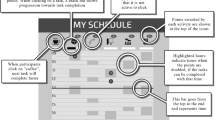Abstract
In the present article we focus on the cost or disutility of engaging in activities arising from the time pressure people frequently experience when they have committed themselves to perform too many activities in a limited amount of time. Specifically, we propose that anticipated time pressure increases the likelihood of two types of planning, one short-term and the other long-term encompassing different strategies for eliminating or deferring activities. In addition, we discuss several behaviorally realistic such strategies. It is assumed that strategies differ depending on whether an activity satisfies physiological needs, is performed because of institutional requirements or social obligations, or is performed because of psychological or social motives. Strategies are also assumed to differ depending on the degree to which planning is feasible. Computer simulations of available activity data are presented to illustrate consequences of the different strategies on time pressure and activity agendas.
Similar content being viewed by others
References
Axhausen KW & Gärling T (1992) Activity-based approaches to travel analysis: conceptual frameworks, models, and research problems. Transport Reviews 12: 323–341.
Bhat CR & Koppelman FS (1993) A conceptual framework of individual activity program generation. Transporation Research A 27: 433–446.
Buehler R, Griffin D & Ross M (1995) It's about time: optimistic predictions in work and love. In: W Stroebe & M Hewstone (eds.) European Review of Social Psychology (Vol 6, pp 1–32). Chichester, UK: Wiley.
Doherty ST & Miller EJ (1999) A computerized household activity scheduling survey. Transportation, in press.
Edland A & Svenson O (1993). Judgment and decision making under time pressure. In: Svenson O & Maule AJ eds Time Pressure and Stress in Human Judgment and Decision Making (pp 27–40). New York: Plenum Press.
Ettema D, Borgers A & Timmermans HJP (1993). Using interactive computer experiments for investigating activity scheduling behavior. Proceedings of the 21st Summer Annual Meeting, University of Manchester, P366, pp. 267–282.
Ferrari JR, Johnson JL & McCown WG eds (1995) Procrastination and Task Avoidance. New York: Plenum Press.
Gärling T (1992) The importance of routines for the performance of everyday activities. Scandinavian Journal of Psychology 33: 170–177.
Gärling T, Axhausen K & Brydsten M (1996) Travel choice and the goal/process utility distinction. Applied Cognitive Psychology 10: 65–74.
Gärling T, Brännäa K, Garvill J, Golledge RG, Gopal S, Holm E & Lindberg E (1989). Household activity scheduling. In: Transport Policy, Management & Technology Towards 2001 (Vol IV, pp 235–248). Ventura, CA: Western Periodicals.
Gärling T & Garvill J (1993). Psychological explanations of participation in everyday activities. In: T Gärling & RG Golledge eds, Behavior and Environment: Psychological and Geographical Approaches (pp. 270–297). Amsterdam: Elsevier/North-Holland.
Gärling T, Gillholm R & Gärling A (1998a). Reintroducing attitude theory in travel behavior research: the validity of an interactive interview procedure to predict car use. Transportation 25: 129–146.
Gärling T, Kwan M-P & Golledge RG (1994) Computational-process modelling of household activity scheduling. Transportation Research B 25: 355–364.
Gärling T, Kalén T, Romanus J, Selart M & Vilhelmson B (1998b). Computer simulation of a theory of household activity scheduling. Environment and Planning A 30: 665–679.
Gillholm R, Ettema D, Selart M & Gärling T (1996). The role of planning for intention-behavior consistency. Technical Report #26:8. Göteborg, Sweden: Department of Psychology, Göteborg University.
Golledge RG, Kwan M-P & Gärling T (1994). Computational-process modelling of household travel decisions using a geographical information system. Papers in Regional Science 73: 99–117.
Hanson S (1982). The determinants of daily travel-activity patterns: relative location and sociodemographic factors. Urban Geography 3: 179–202.
Hanson S & Huff P (1988). Repetition and day-to-day variability in individual travel patterns: implications for classification. In: Golledge RG & Timmermans HPJ eds Behavioral Modeling in Geography and Planning (pp 368–398). London: Croom Helm.
Hayes-Roth B & Hayes-Roth F (1979) A cognitive model of planning. Cognitive Science 3: 275–310.
Kahneman D, Slovic P & Tversky A eds (1982) Judgment under Uncertainty: Heuristics and Biases. New York: Cambridge University Press.
Kitamura R (1988) An evaluation of activity-based travel analysis. Transportation 15: 9–34.
Kitamura R & Fujii S (1998). Two computational process models of activity-travel choice. In: Gärling T, Laitila T & Westin K eds The Theoretical Foundations of Travel Choice Modeling (pp 251–279). Amsterdam: Elsevier.
Lundberg U (1993) On the psychobiology of stress and health. In: Svenson O & Maule AJ eds Time Pressure and Stress in Human Judgment and Decision Making (pp 41–53). New York: Plenum Press.
Lundberg U (1996) Influences of paid and unpaid work on psychophysiological stress responses of men and women. Journal of Occupational Health Psychology 1: 117–130.
Newell A (1990) Unified Theories of Cognition. Cambridge, MA: Harvard University Press.
Pas EI (1988) Weekly travel-activity behavior. Transportation 15: 89–110.
Pendyla RM, Kitamura R, Chen C & Pas EI (1997) An activity-based microsimulation analysis of transportation control measures. Transport Policy 4(3): 183–192.
Simon HA (1990) Invariants of human behavior. Annual Review of Psychology 41: 1–19.
Supernak J (1992) Temporal utility profiles of activities and travel: uncertainty and decision making. Transportation Research B 26: 61–76.
Author information
Authors and Affiliations
Rights and permissions
About this article
Cite this article
Gärling, T., Gillholm, R. & Montgomery, W. The role of anticipated time pressure in activity scheduling. Transportation 26, 173–191 (1999). https://doi.org/10.1023/A:1005123527913
Issue Date:
DOI: https://doi.org/10.1023/A:1005123527913




